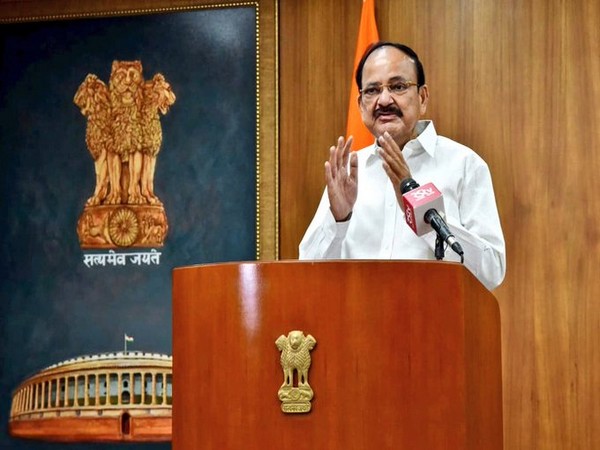VP Naidu calls for reorienting agricultural priorities for nutrition-sensitive food
Enumerating various government programs for this, the Vice President expressed happiness over provision to provide nutritious breakfast to school children in recently announced Education Policy.

- Country:
- India
The Vice President of India, Shri M. Venkaiah Naidu today highlighted the need to constantly review our food, agriculture and trade policies according to the times. He also called for reorienting agricultural priorities towards more nutrition-sensitive food.
Inaugurating the virtual consultation ‘Science for Resilient Food, Nutrition and Livelihoods’ organized by the M.S Swaminathan Foundation (MSSRF), the Vice President drew attention towards impacts associated with poor diet quality and said that both undernutrition and obesity are significant risk factors for Non-Communicable Diseases.
We must step up investments in improved storage, processing and preservation to retain the nutritional value of food products, rather than investing in highly processed foods, he opined.
Lauding Prof. M.S Swaminathan as a visionary scientist and the architect of India’s Green Revolution, the Vice president expressed happiness that MSSRF aims to accelerate the use of modern science and technology for agricultural and rural development.
He especially commended MSSRF for its pro-poor, pro-women and pro-nature approach and exuded confidence that this virtual consultation will help in evolving new strategies and practices to promote food security and nutrition.
Expressing his respect and gratitude to Dr Swaminathan for helping farmers through technology, the Vice President said that he closely follows Dr Swaminathan’s suggestions and would pursue them at all levels including the Parliament.
Shri Naidu also endorsed Dr Swaminathan’s suggestion to provide land rights to the women. “Land rights, pattas and all other property should be jointly in the name of man and woman ”, he said.
Talking about SDG goals, the Vice President said that it is time to take stock of the progress made so far. Where are we in terms of achieving the ‘zero hunger’ and ‘good health and wellbeing’ goals, he asked.
Citing a UN report which states the number of people suffering from hunger in the world has been slowly increasing in recent years, Shri Naidu said that nearly 750 million people were exposed to severe levels of food insecurity in the world in 2019.
Drawing attention to these worrisome hunger indicators in the world, the Vice President emphasised the need to do things differently and more quickly.
We need urgent, focussed and concerted action at national, regional and global levels, he said.
Maintaining that India has made significant strides in reducing hunger, undernourishment, infant mortality, Shri Naidu expressed satisfaction that the Government of India has accorded the highest priority to combating health and nutrition problems in the country.
Enumerating various government programs for this, the Vice President expressed happiness over provision to provide nutritious breakfast to school children in recently announced Education Policy.
Highlighting the impact of Covid pandemic on the lives and livelihood, Shri Naidu said that the problem of hunger and undernourishment may become more acute with the corona induced global economic slowdown.
Shri Naidu lauded Indian farmers for record food grain production despite so many challenges and limitations during the lockdown period. “They could do so because of their commitment, hard work and native knowledge”, he said.
Opining that healthy, socially connected and prepared people are better able to cope with the disasters, The Vice President called for an urgent need to invest in building resilient communities. He also said that policymakers and politicians should also focus on population planning.
Stressing the need to use advances in scientific knowledge for human welfare and reduction of hunger, Shri Naidu called for blending it with the traditional knowledge of indigenous communities.
The Vice President called for concerted action by the public, civil society, Panchayati raj institutions and governments to accelerate progress and in achieving lasting success in this area.
In order to ensure food and nutrition security for all, Shri Naidu called for making agriculture more resilient and profitable. He also emphasised the need to minimise pre-harvest and post-harvest losses and improve market infrastructure. Farmers should be able to get their produce from the farm gates to markets at a reasonable cost, he said.
He wanted the policymakers to promote investment in irrigation infrastructure and focus on R&D to raise the productivity of nutritious foods and help reduce their cost.
Highlighting the importance of anticipatory research, the Vice President said that anticipatory warning benefitted the farmers during recent locust attacks. He called for similar anticipatory warnings to be made for natural hazards such as floods.
Calling for seamless technology transfer and farmer education, Shri Naidu said our laboratories must be firmly linked to our farms and fields.
Shri Naidu also wanted the scientist to make the optimum use of ICT to remain connected with the farmers and provide them timely advice and inputs crucial to the success of their crop.
Stating that India is a treasure trove of traditional wisdom in agriculture, Shri called for making every attempt to integrate the best of these techniques into agriculture along with modern technology.
Listing a number of initiatives taken by the government for doubling the farmers’ income, the Vice President hoped that this conference will help make the national policies more robust by providing the necessary impetus to the process of policy implementation.
Dr M S Swaminathan, Prof. K Vijayaraghavan and scientists and researchers from India and abroad joined in the online consultation.
(With Inputs from PIB)










